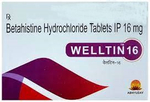hakee
Introduction to Hakee
Hakee is a medication primarily used to manage symptoms associated with Ménière's disease. This condition can cause episodes of dizziness, vertigo, tinnitus (ringing in the ears), and hearing difficulties. While Hakee helps alleviate these symptoms, it is important to note that it does not cure the underlying disease.
Composition of Hakee
Hakee contains the active ingredient Betahistine. Betahistine works by modifying the way the body uses a substance called histamine, which improves blood flow to the inner ear and brain, aiding in the recovery of the balance system and helping the brain adjust to dizziness.
Uses of Hakee
- Relieves dizziness and vertigo
- Reduces tinnitus (ringing in the ears)
- Improves hearing problems associated with Ménière's disease
Side Effects of Hakee
Common Side Effects:
- Nausea
- Indigestion
- Headaches
- Stomach issues such as vomiting, pain, or bloating
- Skin reactions like rash or itching
Serious Side Effects:
- Severe allergic reactions
- Difficulty breathing
- Swelling of the face, lips, or throat
Precautions of Hakee
Before taking Hakee, inform your doctor if you have any of the following conditions: a rare tumor called phaeochromocytoma, allergies to Betahistine, stomach ulcers, asthma, hives, rashes, hay fever, or very low blood pressure. Your doctor will need to take extra care in prescribing this medication.
How to Take Hakee
- Take the initial dosage of 16mg three times a day, preferably with food.
- Your doctor may adjust your dose to be between 24mg and 48mg total per day.
- Hakee is not recommended for children under 18 years of age.
Conclusion of Hakee
Hakee is an effective medication for managing the symptoms of Ménière's disease, such as dizziness, vertigo, and tinnitus. While it does not cure the disease, it can significantly improve the quality of life for those affected. Always follow your doctor's instructions and report any side effects or concerns promptly.
Similar Medicines
Available in 2 variations

Hakee 8mg Tablet
Hakee 8mg Tablet
strip of 10 tablets

Hakee 16mg Tablet
Hakee 16mg Tablet
strip of 10 tablets
Related Faqs

What are the common side effects of NO Dizz?
NO Dizz can cause mild stomach problems such as vomiting, stomach pain, stomach swelling (abdominal distension) and bloating. You can reduce the chances of getting these side effects by taking NO Dizz with food. However, the absorption of NO Dizz may get reduced when taken with food.

What are the common side effects of Okahistine?
Okahistine can cause mild stomach problems such as vomiting, stomach pain, stomach swelling (abdominal distension) and bloating. You can reduce the chances of getting these side effects by taking Okahistine with food. However, the absorption of Okahistine may get reduced when taken with food.
Related Posts

1:15
Why Is Calcium Important for Kids? Common Deficiency Symptoms You Shouldn’t Ignore!

1:15
How to Increase Your Child’s Weight Naturally? Healthy Diet Tips for Parents!

1:15
Are Your Hormones Out Of Balance? Signs & Symptoms!

1:15
Amazing Benefits of Flaxseeds | Best Way to Eat Flax Seeds Daily!

1:15
Why Is There Blood in Your Poop? Causes, Symptoms, and When to See a Doctor!
Disclaimer : This information is not a substitute for medical advice. Consult your healthcare provider before making any changes to your treatment . Do not ignore or delay professional medical advice based on anything you have seen or read on Medwiki.
hakee
Prescription Required
Manufacturer :
Vatican Life Sciences Pvt LtdComposition :



















.svg)
